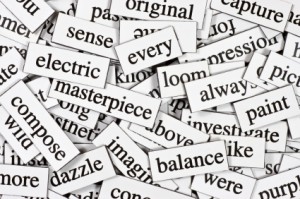Everyone has their stable of favourite words. Which of yours hit the sweet spot of delight?
Here are a few that blow my hair back: LUCIDITY (as in a profound “AHA” moment), VOLUMINOUS (hair which I have not) and SAGACITY (wisdom / good judgment) – which my thinning pate proclaims to celebrate.
One of my favourite verbs is GLEAN – it sounds like such a clean, purposeful process of assimilating, sorting, digesting and extruding useful information i.e. grasping the PITH of “what matters most” from among the DROSS of communication. GLIB is another expressive verb – being relatively articulate but insincere… as in the inconsequential froth of gutter journalism.
Then there are expressive loan words from other cultures that delight. Like the Yiddish SHLEP, from the German “to drag” (e.g. “It’s such a schlep standing in queues”) or GLITCH, originally from the German “to slip” – which also has a satisfyingly onomatopoeic quality about it. Almost like the sound when you step on an insect inadvertently. Proofreaders are paid to pick up and rectify errors and omissions… glitches in the works. And it’s far more polite to use a euphemism like “having found a few GREMLINS” than saying “I discovered some glaring mistakes”. Continue reading






![victoriaetching[1]](http://gavinford.com/thinkspot/wp-content/uploads/2011/06/victoriaetching11-207x300.jpg)